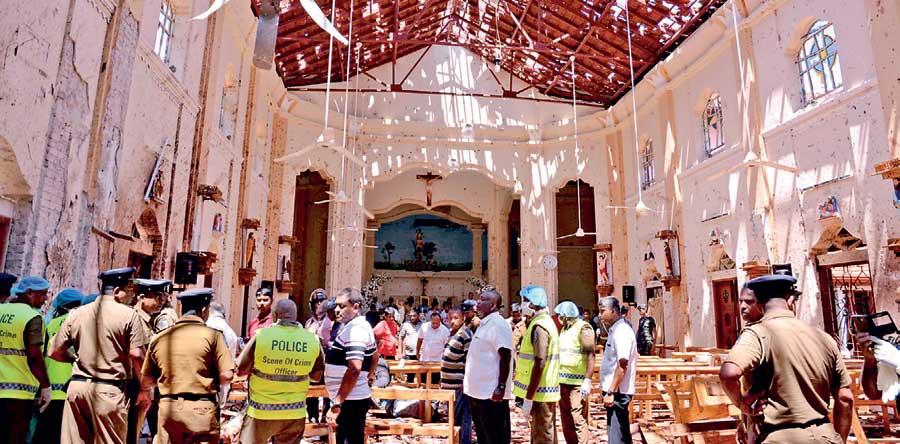15 Jul 2019 - {{hitsCtrl.values.hits}}

- Forward strategies and policies of preventing future terror attacks are lost in fierce political debates,
- Attacks of 21 April signified the approaches of extremists via selection of soft targets
Nearly three months since the Easter attacks in Sri Lanka, the forward strategies and policies of preventing future terror attacks are lost in fierce political debates, elections buildup and conspiracy theories which are further fracturing the most important compound that keeps a society away from extremism; social cohesion. 
The lawmakers are debating new prevention of terrorism legislation, political voices are drowned by populist rhetoric, and national security seems to be a primer for debate yet miserably distant from any concrete policy articulations. In short, the attacks of 21 April signified the trademark approaches of extremists globally via the selection of soft targets.
Apart from the challenge of how to securitize soft targets comes the challenge of identifying and preventing so-called lone wolf type attacks that are carried out by terrorists with no real strategic guidance from a terror leadership. These terror strategies represent groupings that are ideologically driven, hence defeating ideas has become a major challenge for established security apparatus in their counter-terror policies.
The important lesson for Sri Lanka is to understand these dual features when framing a response to emerging terror and extremists’ threats in the future. Counter-Terrorism globally took the shape of a hard response to terrorism, using coercive methods and a culture of confidence in offensives from anti-terror legislation to militarizing law enforcements and military offensives. This is how Sri Lanka defeated the LTTE, the Russians defeated Chechen rebels and Americans dismantled Al Qaeda.
Islamic State-related and even radical far-right extremists have adopted new forms of violent extremism that are mostly driven by communication strategies harnessing the power of ideas and the pull of ideological positionings, such as religious extremism of racial superiority complex. Thus the fight to defeat such organizations that have carried out the most number of terror attacks in the world cannot be totally dependent on hard countermeasures. Identified as lone wolf type attacks and mostly the perpetrators are not foreign elements. Thus the category of home-grown terrorism is used to identify them. Most of these radicalized, extremists have adopted to carry out attacks on soft targets.
Terrorists, extremists of the full political spectrum, religious, far-right to narco-terrorists have selected soft targets as their preferred mode of unleashing violence. Soft targets include shopping malls, theatres, markets, night clubs, schools and hotels. In the context of Islamic State-related attacks, hotels were always preferred sites of attacks, prior to Sri Lanka, if one analyses the attacks across Indonesia, Egypt, Mali and Jordan Hotels were frequently targeted resulting in mass casualties.
Hotels remain symbolically and tactically the indispensable structure of tourism and state of global connectivity of a nation. Hotels can never be promoted as garrisons thus there is always a limit to how much protection can be added to a hotel structure. Thus, they will remain perpetual targets of terrorists for years to come. With a burgeoning tourist industry and an aspiration to remain the most favoured travel destination in the world, Sri Lanka cannot rely on fortification of hotels or militarization of tourist attractions.
Countering of Violent Extremism (CVE) has become a contested but much-needed framework of analysis in the backdrop of increasing radicalization, extremism, home-grown terrorism and most important attacks that are targeting free and open societies in the world. Sri Lanka experienced an Utopian moment of a decade of peace and openness that even many Western societies were envious of since the end of the war on LTTE terrorism in 2009. The high point of this Utopian moment was the travel guidebook, lonely planet naming of Sri Lanka as the world’s best travel destination.
Free and open societies, especially democracies which are going through political failures of both leadership and institutional decay are prime targets of extremist ideologies and infiltration. These infiltrations are facilitated through migrant workers, religious leaders and even foreign fighters who circulate globally. The last five years had witnessed the emergence of  terror movements ideologically driven and with global reach and adaptability.
terror movements ideologically driven and with global reach and adaptability.
Islamic State fought in open battle theatres in Syria and Iraq while in other global destinations it spearheaded a massive communication and recruitment drive leading to radicalization to promote homegrown terror.
In July 2015 President Obama in an address at the Pentagon, observed:
“To prevent deadly terrorist attacks, we cannot solely rely on counterterrorism strategies. We must start further upstream challenging extremists’ narratives and ideologies and addressing the conditions that create a favourable environment for radicalization and recruitment” he made this observation given the last decade, most terror attacks in Western and democratic States were carried out by radicalized extremists and these accounted for nearly 70 percent of all known terror attacks since 2006.
Thus, the policy imperative has been to frame ways in which social cohesion as the main objective which can lead to the building of resilient societies. This approach makes Countering of Violent Extremism (CVE) distinct from traditional heavily securitized counter-terrorism approaches which feature the use of force through a combination of combat and operations the institution of extra-judicial law enforcement procedures. It yet remains a fairly new approach even the US Department of Homeland security started investing on CVE measures as recent as in 2016.
While CVE remains in part rhetoric, and in part a subfield in counter-terrorism its proponents see the importance of the approach as more holistic as its core strength is the societal focus that encompasses traditional iterations of de-radicalization and violence de-escalation such as community policing and even forms of reconciliation.
Sri Lanka with all its political idiosyncrasies remain a democratic polity and therefore it sees no other political alternative in the future, thus weak democracies can lead to state failures, contrary to some Western analysts who attempt of frame Sri Lanka as a fragile and weak State yet the recent trends of ethnic and religious tensions can further escalate the national security crisis of responding to violent extremism.
Thus while the State is seeking remedies from legislation and law enforcement upgrades which are necessary but not sufficient as neither law enforcement nor legislation are a fix to ideologically powered violence thus it needs more sophisticated policy solutions which have to be integrated into the security discourse and the security communities in this country.
While we seek justice and retribution for the Easter Sunday attacks, we also need to understand that it may not be a one-off lone wolf attack, as our intelligence services respond and are actively developing improving information sharing, and analysis it is becoming evident that the lone wolves are actually known wolves. The responsibility of the state is preventing the wolf packs from expanding which cannot be done without policies that address countering ideological narratives and other social and economic conditions that lead to radicalization. This article is an attempt to explore multiple dimensions of countering violent extremism approaches in Sri Lanka and the global and local conditions which shape and generate such tendencies and how best to mitigate them.
29 Dec 2024 16 minute ago
29 Dec 2024 3 hours ago
29 Dec 2024 3 hours ago
29 Dec 2024 5 hours ago
29 Dec 2024 6 hours ago